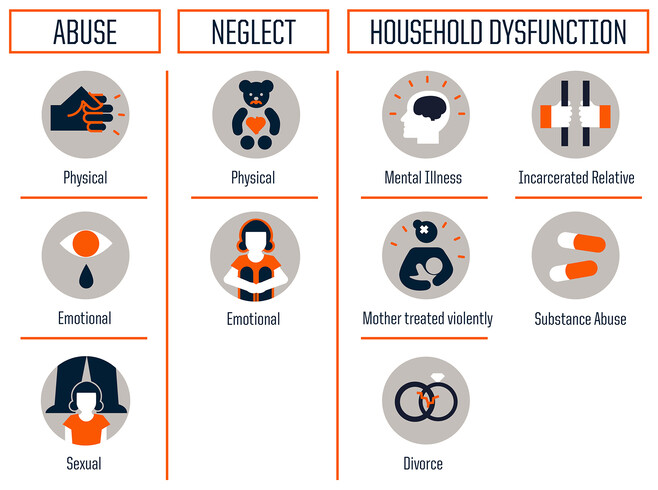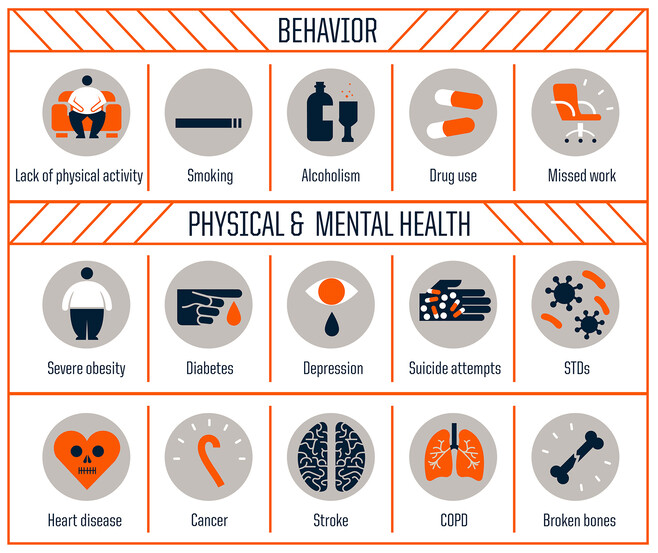ACEs 101: How Adverse Childhood Experiences Affect You

We all go through awful and distressing situations that we have to endure. Unfortunately, when these experiences are traumatic enough, especially in early childhood, they can quite literally change the way our genes function. This makes us prone to developing chronic diseases, abusive habits, and dysregulation in our daily lives.
Clinically, our negative childhood experiences are called Adverse Childhood Experiences, or ACEs. Many of us have ACEs, and the higher our ACE scores are, the more likely we are to experience challenges with our emotions and behaviors as adults.
This blog post will cover what ACEs are, how they can affect you, and what you can do to start or to continue healing.
As you read this article, the most important thing to remember is that you are not your trauma. These things may have happened to you outside of your control, but you ultimately still have the personal agency to make decisions that can change your life, today. Agency is “the sense of control that you feel in your life, your capacity to influence your own thoughts and behaviour, and have faith in your ability to handle a wide range of tasks and situations.”
What Are Adverse Childhood Experiences (ACEs)?
Adverse Childhood Experiences (ACEs) are the psychological injuries we sustain when we experience high doses of distress early on in life. These experiences may include adversities such as:
- Abuse (physical, mental, emotional, substance)
- Neglect (physical, mental, emotional)
- Insecurity (housing, food, social, emotional)
- Racism
- Violence
- Abandonment
The quality of our early life experiences, both positive and negative, is critical to how our brains develop. At the age of 5, our brains are pretty much fully developed, up to 90% of an adult brain! So of course our early experiences have a great impact on how we develop as adults.
Research says there is a direct link between the onset of chronic adult diseases and childhood trauma after studying the health of 17,000 people.
This is because ACEs generally lead to a condition called Toxic Stress Response. This is a condition that causes “long-term disruptions in brain development and immune, hormonal, and metabolic systems, acting through genetic regulatory mechanisms” (Science of ACEs).”
When we’re exposed to too many negative experiences in childhood, the cumulative effects can change how our cells function and divide - a process called methylation. Simply put, this is the process that makes sure that our bodies are producing proper indicators for health.
Think of it as a way that our cells modify in order to help us adapt to our environment. While not exactly the same, it is similar to the idea of how our body responds when we catch a cold (produces antibodies to fight infection) or when we go through puberty (changes in hormones).
Three Types of ACEs

Source: Centers for Disease Control and Prevention
Credit: Robert Wood Johnson Foundation
The Effects of High ACEs
The effects of ACEs can be quite detrimental to one’s well-being. Research shows that individuals with 6 or more ACEs have a 19-year shorter lifespan on average. These are some of the things observed in individuals with high ACE scores:
- Likely to develop chronic diseases such as diabetes, strokes, cancers, PTSD, and other health concerns.
- Prone to developing mental health issues, such as depression and anxiety.
ACEs Increase Health Risks

Source: Centers for Disease Control and Prevention
Credit: Robert Wood Johnson Foundation
Finding Your ACE Score
You can find your ACE score by using this questionnaire: ACE’s Questionnaire
What To Do About It
Our trauma can weigh us down, and if these experiences make you feel broken, unlovable, or unaccepted - you’re not alone.
Finding out your ACE score can be an incredibly valuable start to your journey to healing. Recognizing where you’re hurting, the patterns of your trauma, practicing methods of healing, and having faith that it is possible to lead a wonderful and fulfilling life is the first way that you can take your power back.
Here are four tried-and-true methods you can try today:
- Writing to Heal
Processing your trauma starts with the story that you tell yourself. Developed by professor of psychology James Pennebaker, “writing about our deepest emotions and thoughts about the emotional upheaval that has been influencing our lives the most allows us to really let go and explore how event(s) has affected us” (Aces Too High).
Write continuously for 20 minutes a day with no filter. Aim to dump everything you’re feeling and your darkest secrets out on paper. Remember, this is for your eyes only, so try to be as honest as possible.
- Practicing Mindfulness
A symptom of childhood trauma shows up as dysregulation in our everyday life. You may feel a lot of emotions that are unwelcomed and intrusive, and have a hard time managing them. If this happens - it's okay. You are okay, and you are safe in this moment. Your nervous system is wired to respond in a certain way when stress happens. Practicing mindfulness can help you detach from those automatic responses, intense thoughts and emotions, and ground you in the present moment. You are not your thoughts or emotions, but the vessel that is experiencing them.
Just 5 minutes a day can have incredible, positive effects on your brain’s physiology.
- Yoga
Individuals with ACEs often store decades of tension, stress, and fight-or-flight responses in their bodies. Yoga helps to promote blood flow to areas of our brain to reduce stress. It also increases a chemical in our brain called GABA to promote calmness and protect us again mental health disorders.
- Therapy
Given the significant impact of ACEs on wellbeing, therapy can support in understanding how your childhood experiences may be impacting you now.
Childhood trauma disrupts our ability to form healthy attachment bonds with people. The negative experiences and memories we hold onto affect the way we show up in our relationships.
Therapy can be a safe space to feel heard and accepted without judgement. Opening up to your therapist can also help you practice healthy relationship bonding and attachments. Your therapist is there to guide you in a positive direction.
The Family Centre offers counselling services. Your first session is always free and subsidies are available for follow-up sessions.
A Final Word for Your Healing Journey
Remember, your ACE score is a tool for you to understand yourself and not an indicator of how broken you are. Don’t be disheartened as you learn about your ACE score. Instead, try to frame it as a learning experience, and as a way to understand what happened to you and the resources available for you to heal.
No matter how dysregulated or broken you feel, there is nothing “wrong with you”. The experiences that you survived in early childhood do not make you “less than” as a human being, or have to define you or your future.
It may seem difficult or even impossible to change your circumstances, but every choice you make, no matter how small, can lead to powerful breakthroughs.
Millions of people with ACEs have found hope, healing, and recovery. With a little bit of grit, faith, and proper support, you absolutely can too.
exclusively written for familycentre.org
by Jessica Tran
